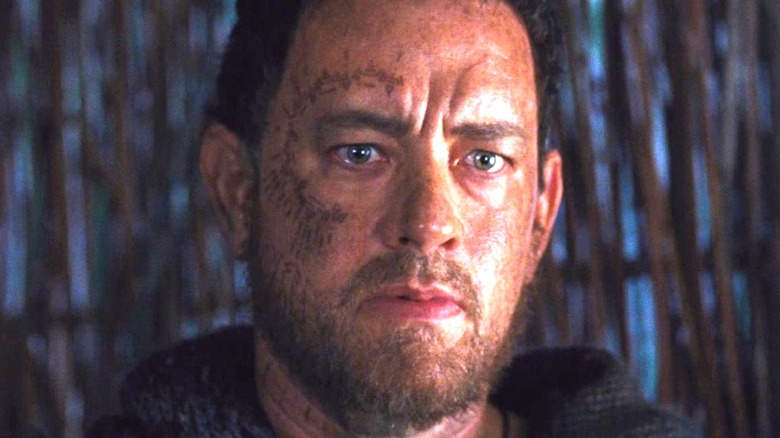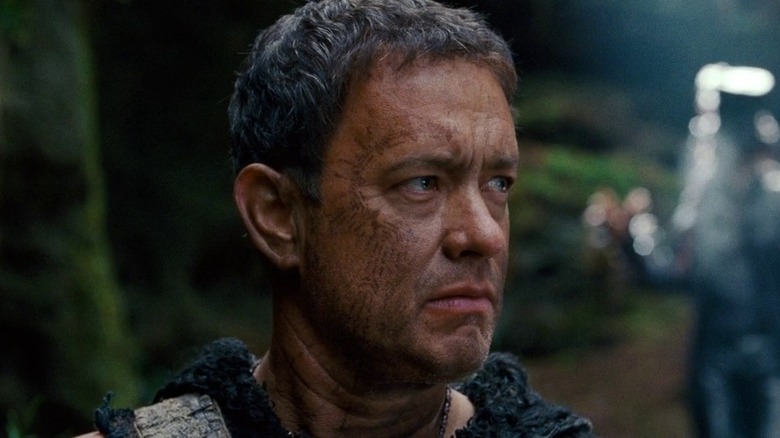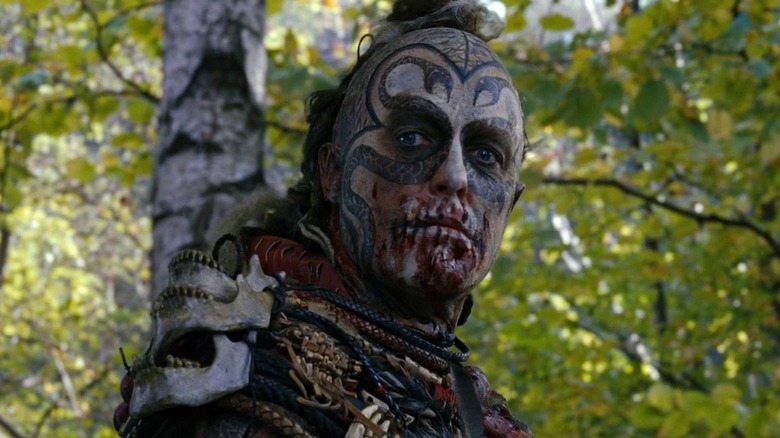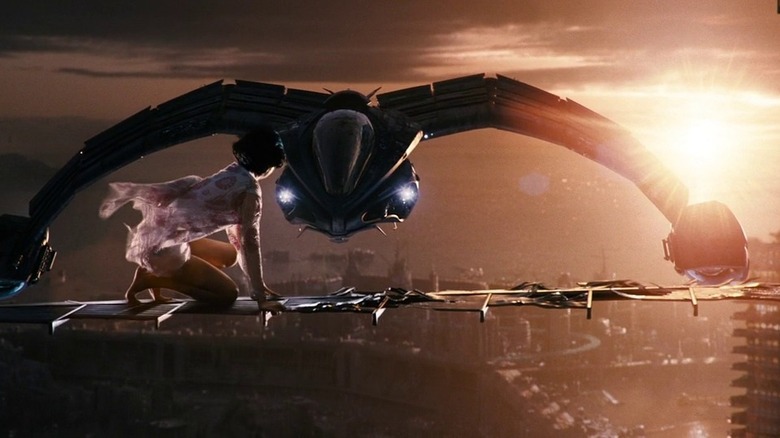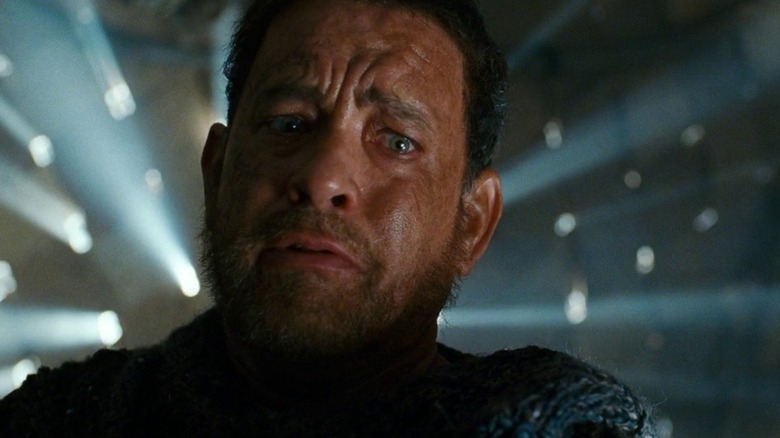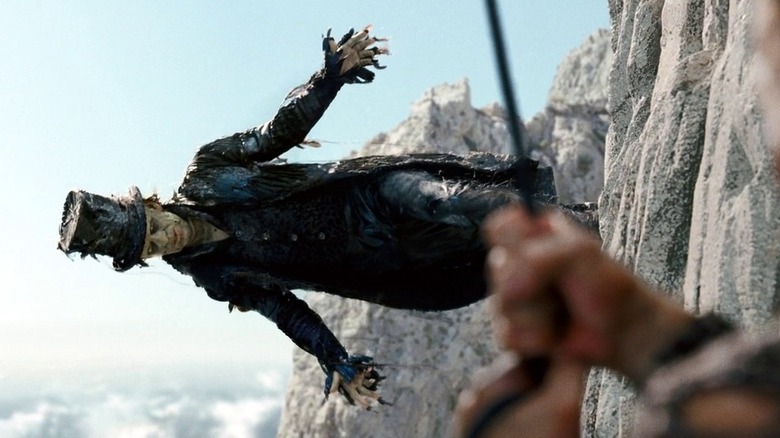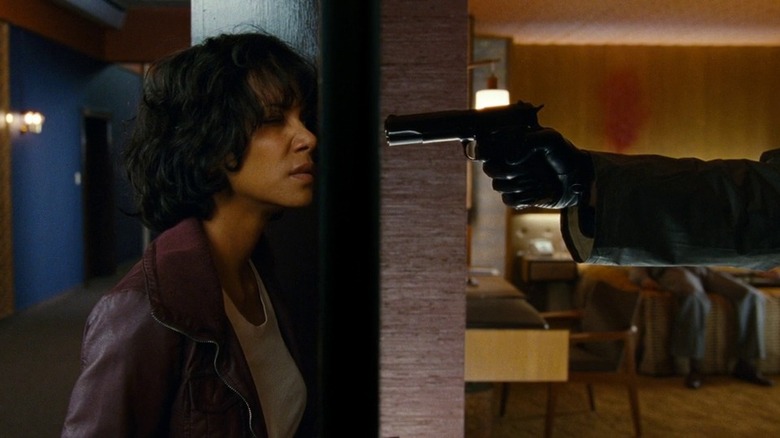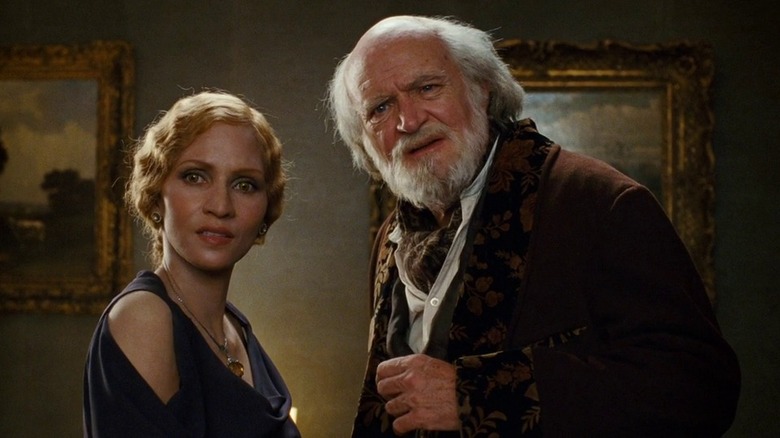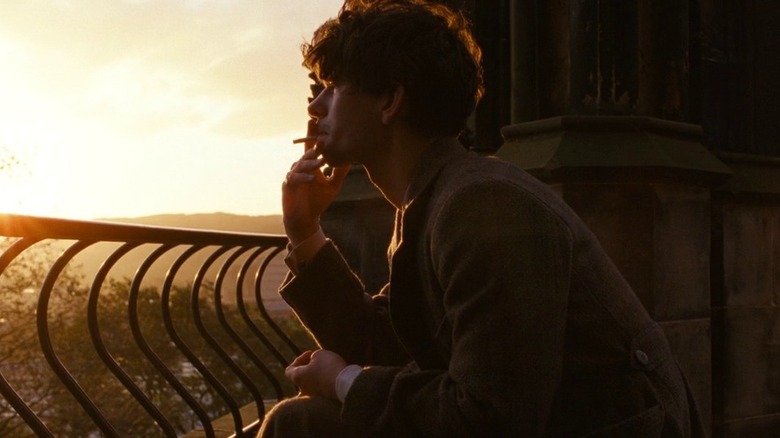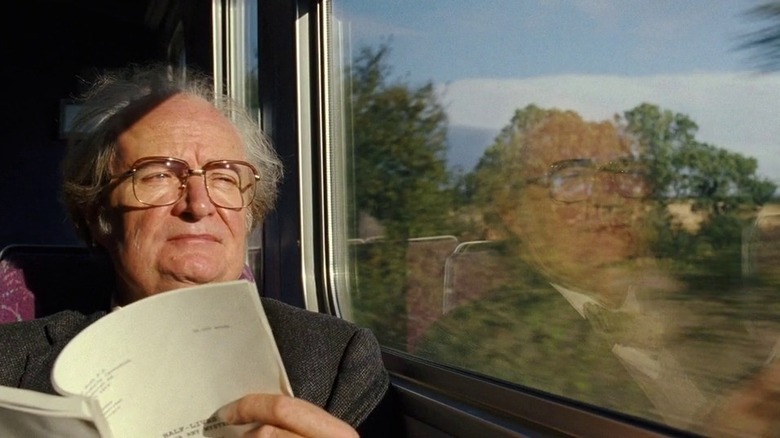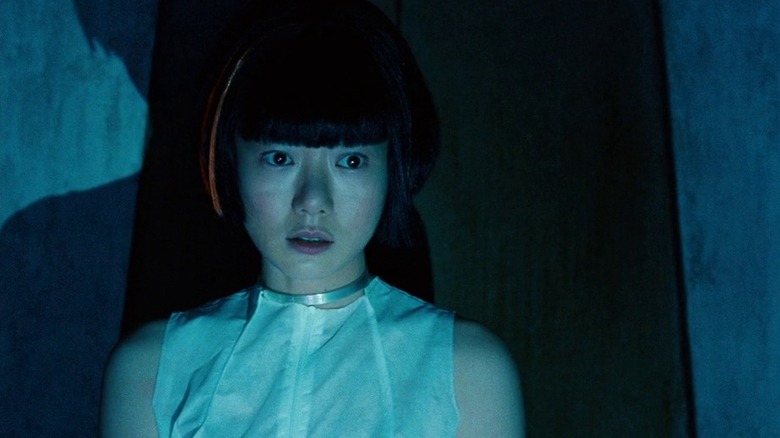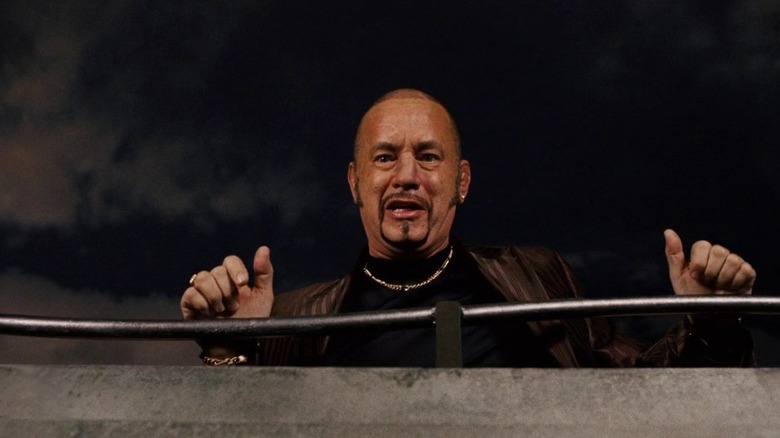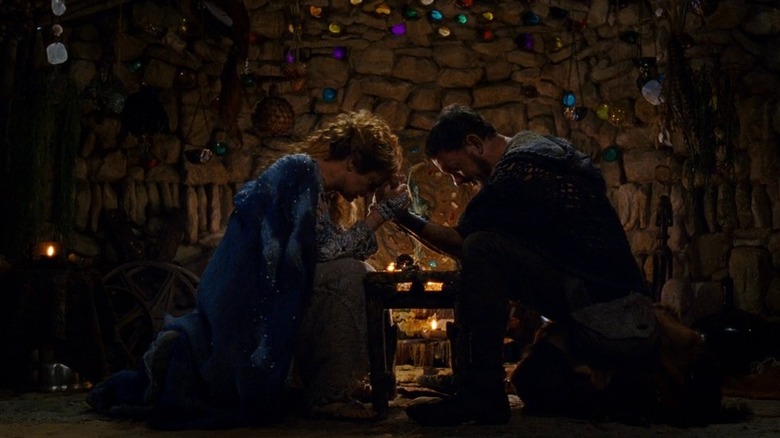Cloud Atlas Facts Fans Will Love
Perhaps "Cloud Atlas" was always destined to be a cult classic. After all, this directorial effort from Tom Tykwer and the Wachowski Sisters is an expansive piece of cinema that spans multiple centuries, with actors inhabiting multiple characters across varying eras and spouting dialogue punctuated with odd turns of phrase. Adapted from a novel of the same name by David Mitchell, "Cloud Atlas" is a deeply idiosyncratic work that won't be to everyone's taste. But for those who can get on its wavelength (and can stomach some glaring flaws in its handling of race), "Cloud Atlas" has proven to be something truly special, a slice of epic cinema bursting with imagination.
All of that imagination reflects the hard work that went into crafting "Cloud Atlas," with many of its most intriguing behind-the-scenes elements informing a large portion of this movie's legacy. Even with all the discussion this bold piece of filmmaking has inspired, there's plenty about "Cloud Atlas" that's far from common knowledge, including which actors were originally rumored for the cast, when Hugh Grant joined the production, and how Tom Hanks feels about this movie after so many years. "Cloud Atlas" delivers so much bang for your buck in its lengthy runtime, it should come as no surprise that its behind-the-scenes stories are similarly expansive and jam-packed with intricate details.
The original cast of Cloud Atlas
As "Cloud Atlas" was first getting off the ground, a report emerged regarding a slew of big-name actors who were set to be in the movie. It's no surprise that the production was aiming to secure well-known celebrities, since a film this unusual and lacking in universally known source material was going to need recognizable celebrities to draw in audiences. The first report of the film's cast included actors who would eventually appear in the movie, namely Tom Hanks and Halle Berry, but also contained actors who never signed on, including James McAvoy and Ian McKellen (per NME).
The most intriguing actor here who never made it into "Cloud Atlas" is Natalie Portman, with whom the Wachowski sisters had worked with 2005's "V for Vendetta." Portman had also worked with fellow "Cloud Atlas" director Tom Tykwer on a segment in the anthology film "Paris, je t'aime" and had even been rumored to have some connection to the project dating back to early 2009. Portman didn't end up in "Cloud Atlas" and it's never been officially confirmed which role she could've played. However, her being connected to the production for so long speaks to the caliber of actors that the producers behind "Cloud Atlas" were trying to secure for this ambitious blockbuster.
Hugh Grant was a last-minute addition to the cast
The original cast of "Cloud Atlas" was already stacked with so much talent, including Tom Hanks, Halle Berry, and Hugo Weaving, that it might seem like overkill to toss somebody else into its expansive roster of performers at the last minute. However, the producers of "Cloud Atlas" did just that by not only adding Hugh Grant to the movie's cast but getting him to sign on the day before principal photography commenced (via Film Stories). Though he was a last-minute addition to the sprawling ensemble, Grant has had nothing but positive things to say in his reflections on this unorthodox motion picture.
Speaking to Collider in 2016, Grant noted that his initial response to the offer to be in "Cloud Atlas" was uncertainty over whether or not the offer was even real. Once he dug into the nitty-gritty of what the movie entailed, Grant learned that he was only being offered five separate roles, in contrast to the other main actors inhabiting six characters each. After requesting and getting a sixth role to play, Grant proceeded to be enthralled by the set of "Cloud Atlas" and especially by the passion the Wachowskis had for cinema. The actor also explained that the project holds a special heart as one of the last movies he appeared in that was shot on 35mm film. Even though he wasn't always intended to be a part of its cast, Hugh Grant found himself entirely enamored with the world of "Cloud Atlas."
The Wachowskis partially financed Cloud Atlas themselves
Getting the money together for "Cloud Atlas" was not an easy task. Even with a star-studded cast on board to headline the feature (not to mention the Wachowskis having several box office hits under their belt), this was still a super risky project. "Cloud Atlas" was going to be rated R, would not be based on universally well-known source material, and would cost a lot to be properly realized. It's no surprise, then, that directors Tom Tykwer and the Wachowskis had such extensive problems securing financing that they had to turn to drastic measures to get this movie the funds it needed.
Speaking to The AV Club, the Wachowskis recalled how they had to reach for money out of their own pocket to get "Cloud Atlas" off the ground. This was in addition to the cash that the sisters' own production company already put up, with the directors estimating that their personal contributions to the budget of "Cloud Atlas" eventually hit around $7 million. That still wasn't close to covering the massive $102 million budget of the final product, but putting down millions of dollars still showed just how committed Lana and Lilly Wachowski were to realizing "Cloud Atlas" on an appropriately massive scale.
Why Tom Hanks was the glue holding Cloud Atlas together
It never hurts to have Tom Hanks in your movie. One of the most beloved actors in Hollywood, Hanks has never wavered as somebody audiences love to see in movies. On a purely business level, getting Hanks for "Cloud Atlas" was a major coup, a sizeable victory that could reassure the potentially frazzled nerves of the movie's financiers. However, Hanks became much more important to "Cloud Atlas" than just serving as a recognizable name on its poster. The very existence of the movie was often saved by how committed Hanks was to this project.
In talking about the movie to The A.V. Club, Lana and Lilly Wachowski recalled how often the cast's agents tried to talk their clients out of being in "Cloud Atlas." Whenever these performers or financiers began to waver in their commitment to "Cloud Atlas," Hanks was always somebody who would say that he was 100% onboard for the project, which inspired others to also firm up their loyalty. There was always going to be risk and trepidation involved in making a movie like this, but having Tom Hanks be so loyal to the vision of Tykwer and the Wachowskis helped a lot in inspiring confidence in "Cloud Atlas."
Cloud Atlas was one of the biggest independent movies of all time
With their trilogy of "Matrix" movies and "Speed Racer," the Wachowksis became experts in the world of major studio films. However, for "Cloud Atlas," the sisters and their collaborator Tom Tykwer couldn't turn to a big studio like Warner Bros. to secure the massive budget required. This wasn't going to be quite as accessible as past Wachowski movies, which already pushed the boundaries of what could be considered conventional mainstream entertainment. Unsurprisingly, the team behind "Cloud Atlas" had to turn to largely independent financing to get this ambitious project off the ground.
The Wachowskis' long-time home of Warner Bros. did cough up $20 million of the $102 million budget that "Cloud Atlas" required (per The Guardian), but much of the finances came from Tom Tykwer's home country of Germany. The German Federal Film Fund gave an unprecedented sum of money to a motion picture production when it helped contribute to the budget of "Cloud Atlas" (via Screen Daily). Because of it being largely realized through funds that came outside of the Hollywood system, outlets like Bloomberg began declaring that "Cloud Atlas" was one of the biggest independent films ever produced. That's a mighty big feat, and a fittingly unique one for a movie as idiosyncratic as "Cloud Atlas."
How Halle Berry changed plans to shoot Cloud Atlas chronologically
Juggling six different storylines told across six radically different time periods was already going to make "Cloud Atlas" an enormous undertaking for all involved. In talking to Viva Press, Halle Berry noted that the original plan for "Cloud Atlas" was shooting the movie in chronological order, or at least in a manner evoking it. Given that the final product cuts across different eras of history, this planned shooting style presumably involved filming "Cloud Atlas" on a timeline that followed when events happened in history, rather than when they'd happen in the movie. This would've entailed the sequences set in 1849 being shot first, followed by the 1936 storyline, and so on.
However, Berry noted that all of this was thrown out the window when she broke her foot only two days before principal photography began on "Cloud Atlas." Initially, Berry was petrified that she would be replaced on "Cloud Atlas," but instead, everyone involved in the movie restructured the shoot to accommodate her injuries. Sequences depicting one of Berry's characters climbing up a mountain were delayed deep into the shoot, while the production moved frequently between Majorca and Germany. This ensured that Berry could still be a part of "Cloud Atlas," even if it also thwarted another ambitious facet of the movie's production.
Why the Wachowksis broke their no-press tradition for Cloud Atlas
The Wachowskis have never been the kind of people to do interviews. They're a duo that often lets their idiosyncratic works speak for themselves, and with good reason. What else could they say about projects as unique as "Speed Racer" that the movies themselves couldn't say? But for their 2012 feature "Cloud Atlas," the sisters broke that tradition and hit the road to talk in lengthy interviews about their newest directorial effort.
As they explained to The AV Club, a key reason for this eschewing of tradition was simply that they weren't the only directors on "Cloud Atlas." Their co-director, Tom Tykwer, was out stumping for the movie as hard as he could. Seeing how much effort he was putting into the promotional push for "Cloud Atlas," the Wachowski sisters decided to also partake in interviews and other marketing tactics. The duo also noted that their willingness to do press for this particular production stemmed from how important this ambitious motion picture was to them. Given how the complex, time-hopping plot left the movie open to pre-release confusion, they saw promotional interviews as a great way to set the record straight and combat misconceptions over this blockbuster.
Co-director Tom Tykwer also composed the score
Tom Tykwer was so committed to this ambitious project that he didn't just serve as a co-director on "Cloud Atlas" — he also functioned as one of its composers. This is not an unprecedented role for Tykwer to play on a movie, as he composed the score for his earlier directorial efforts like "Run Lola Run" and "The International." For "Cloud Atlas," Tykwer worked on the score with Johnny Klimek and Reinhold Heil, crafting a properly expansive score for this enormous film that took years to put together.
Per Entertainment Weekly, the trio's efforts on the score took such a long process that they began working on the music before the cameras started rolling on "Cloud Atlas," a highly unusual practice in mainstream filmmaking. While these artists were committed to exploring varying musical sounds for the different eras and atmospheres explored across the film's storylines, Tykwer emphasized the importance of creating a musical motif that could be carried through the eras in the narrative. No matter how expansive the scope of the movie, "Cloud Atlas" always had some form of musical consistency linking its disparate characters together, thanks to the efforts of its directors and composers.
The splashy premiere of Cloud Atlas
"Cloud Atlas" was a big movie, so it was only fitting that it would be unveiled to the world in a similarly lavish manner. This epic ensemble piece held its world premiere at the 2012 edition of the Toronto International Film Festival (via The Daily Beast). This was seen as an extra momentous occasion since the Wachowskis were on hand to introduce and talk about their movie — a rarity from a pair of siblings who usually shy away from the press.
It was a big swing to present a movie this ambitious and potentially divisive in this kind of environment. The Toronto International Film Festival is just as well-known for being the end for certain movies and their Oscar ambitions as it is a breeding ground for Best Picture hopefuls. However, outlets like The Hollywood Reporter wrote after the premiere screening that there was a massive standing ovation for the cast and crew of "Cloud Atlas" and that the buzz in the room was electric. "Cloud Atlas" came to the Toronto International Film Festival with hype to spare, and managed to live up to all those expectations rather than get crushed by them.
The yellowface controversy of Cloud Atlas
One of the six segments in "Cloud Atlas" takes viewers to the world of Neo Seoul, 2144. It's a land, as its name would suggest, that's populated by people of Korean descent. At the center of this storyline is Doona Bae as Sonmi-451, but the majority of the other characters in this segment are white actors (including Hugo Weaving and Jim Sturgess) in yellowface playing Korean characters. This is meant to keep in with the story's concept of the same people getting reincarnated into different bodies across different centuries.
Unfortunately, the approach in this segment employs a makeup technique associated with the erasure and caricaturing of Asian people in cinema. Going this route inspired lots of controversy for "Cloud Atlas," with many expressing disappointment that a movie about unity and love for humanity would employ such unavoidably racist tactics (via The Huffington Post). Detractors like Guy Aoki, founding president of the Media Action Network for Asian–Americans, pointed out further problems in this approach, including how the poor quality of the yellowface makeup was a major distraction from the movie's serious tone (per The Guardian). "Cloud Atlas" is full of ambitious and unprecedented swings, but its use of yellowface was a disturbing step backward into familiar dehumanizing patterns against Asian performers in the film industry.
The box office woes of Cloud Atlas
"Cloud Atlas" had a lot riding on its shoulders. With a budget exceeding $100 million, this film was going to need to do sizeable business to justify its price tag. Even more pressingly, the film was following up the 2008 box office dud "Speed Racer," which put a damper on the box office reputation of the Wachowski sisters. The duo had crushed it financially with each installment of the "Matrix" trilogy, but now they were on shakier ground. Perhaps a big swing like "Cloud Atlas," anchored by massively recognizable names like Tom Hanks, would be just the ticket to restoring that clout.
Unfortunately, the movie couldn't meet expectations in its box office run, especially domestically. In North America, "Cloud Atlas" grossed just $27.1 million, a dismal haul that was especially bad for a Hanks movie. Up to this point, "Cloud Atlas" was the second-lowest-grossing movie domestically that Hanks had starred in since the 1990 misfire "The Bonfire of the Vanities" (only "That Thing You Do!" fared worse in this territory). "Cloud Atlas" did do much better on the international market, where it secured $103.5 million, but that was still nowhere near enough to make it profitable on a $102 million budget (before promotion and distribution). Some things were always going to limit the box office potential of "Cloud Atlas," including Warner Bros. never releasing it in more than 2,023 theaters domestically, but there was no getting around the movie's financial shortcomings.
The enduring love for Cloud Atlas
"Cloud Atlas" was divisive among critics upon its initial release, and its box office total cemented it as a financial misfire. All those events could've led to "Cloud Atlas" landing in obscurity once it left movie theaters. But in the years since its release, appreciation for it has only grown and grown. Video essays from the likes of FilmBuffGrabiec and retrospectives on websites like MovieWeb have become increasingly common over the years, with the feature's ambitious nature and weighty themes garnering an ever greater measure of appreciation.
Perhaps the most positive looks back on "Cloud Atlas," though, have come from its actors. Most notably, Tom Hanks, while making an appearance on "The Bill Simmons Podcast" in November 2021, declared "Cloud Atlas" one of his favorite movies to shoot, alongside "A League of Their Own" and "Cast Away."
"We shot ['Cloud Atlas'] on a hope and a dream and nothing but a circle of love," Hanks recalled. "We were part of this big, massive ensemble of fantastic people who were just trying to do the hardest, best work on a deep throw ... that whole movie was such a deep throw that making it was magical." While "Cloud Atlas" may not have immediately taken off as a beloved feature, many have come to echo Tom Hanks in appreciating everything the movie has to offer.
